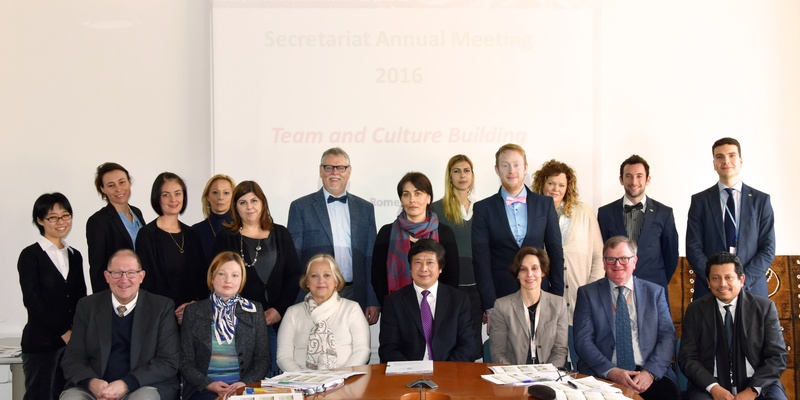Theme of 2016 Annual Meeting for the IPPC Secretariat: Team and Cultural Building
Posted on Fri, 29 Jan 2016, 09:09

The 2016 Annual meeting of the IPPC Secretariat was held on 22 January at the HQ-FAO in Rome, Italy. The main objectives of the meeting were to review the major achievements of the IPPC Secretariat for 2015, to plan the core activities for 2016, and to strengthen internal management. The meeting was chaired by Mr. Jingyuan Xia, the Secretary to the IPPC, with participation of all Secretariat staff. Team Leaders, Brent Larson, David Nowell and Orlando Sosa, made briefings for the respected teams, and Craig Fedchock, the IPPC Coordinator, delivered a report for the IPPC Secretariat. All staff actively shared their views and provided valuable suggestions on improvement of the Secretariat s work and performance. Finally, the Secretary made concluding remarks, highlighting three important points:
1. Major Achievements for 2015. The major milestones of the IPPC Secretariat for 2015 were the transfer of leadership, and the development and early implementation of the action plan for Enhancement Evaluation to the IPPC Secretariat. Among many outputs and achievements, eight major ones were highlighted:
1) Enhancement Evaluation. An action plan for implementation of Enhancement Evaluation to the IPPC Secretariat was developed, fully supported by AG management and CPM Bureau, and well received by FAO senior management.
2) Strategic Planning for the IPPC and Renewing of its Secretariat. The development of five IPPC themes for the next 5 years was widely recognized by the IPPC Community; and renewal of the IPPC Secretariat, included taking several actions and prioritization of five core activities, brought about new performance, new achievements and a new image to the Secretariat.
3) Improving Services to the IPPC Governing Bodies. All meetings of the IPPC governing bodies were held with good preparation, and all reports released in high quality and in a timely manner; and all important decisions made by the IPPC governing bodies such as IYPH and ePhyto, were followed up closely for implementation.
4) Strengthening Standard Settings. Nine ISPMs including 4 PTs and 3 DPs were adopted; 3 consultations were held with 3646 comments from 48 contracting parties; and 6 technical meetings were convened.
5) Promoting Implementation Facilitation: Five projects (totally value of USD 3 million) were implemented with 8 manuals produced and 32 countries involved; aawareness of IPPC dispute avoidance was increased; and the 2nd IPPC Symposium on ePhyto was held in the Republic of Korea with more than 80 participates from over 50 NPPOs, RPPOs and international organizations.
6) Strengthening Integration and Support. A new IPPC website and a web page for IYPH were released, the OCS maintained and PCE was revised; two IPPC Seminars were held, and 94 IPPC news items were made available on the IPP; cooperation with WTO-STDF, WTO-SPS, BLG, AIEA, CABI, WCO and EC were strengthened; and the Resource mobilization was enhanced with a total value of 1 million USD project on ePhyto obtained from STDF and some contribution to IYPH from Ireland.
7) Improving Support to the IPPC Community. The NROs Update was issued monthly and OCPs were being kept up-to-date; 6 IPPC Regional Workshops were organized with 89 CPs participated; and one Technical Consultation among RPPOs was held in USA with all RPPOs present.
8) Strengthening Internal Cohesion. Several SOPs were established for meetings, minutes, Chronicle and communication; 5 new project-funded staff was recruited; transparency for financial management was improved; Integration and Support Team (IS) was set up; and several Task Forces were set up for Resource Mobilization (TFRM), Work Programme and Budget (TFWPB), Communication and Advocacy (TFCA), and CPM-11 (TFCPM-11).
2. Key Activities for 2016. There are eight key activities for 2016: 1) Implementing Enhancement Evaluation in more detail; 2) Improving Services to the IPPC Governing Bodies; 3) Promoting Standard Settings through the establishment of the SSU; 4) Enhancing Implementation Facilitation through the establishment of the IFU; 5) Strengthening Integration and Support for the whole Secretariat; 6) Providing Strong Support to the IPPC Community; 7) Increasing Resources through an active Resource Mobilization programme; and 8) Standardization of Internal Management through the promotion of activities around team and culture building.
3. Team and culture building. The theme of the IPPC Secretariat for 2016 is Team and Culture Building. Setting up such Theme is the key approach towards One IPPC. The main aspects for building team are recognizing the core values of the team; moving towards the same goal of the team; strengthening cohesion within team; and promoting synergies among units. The main approaches for building staff are enhancing accountability; increasing capabilities; promoting creativity; and ensuring effectiveness. The main tasks for building interrelations are advocating mutual trusting; promoting mutual respecting; motivating mutual understanding; enhancing mutual supporting. The main outcomes for team and culture building are that every team member makes positive contributions; all units in the Secretariat work in a cooperative fashion; entire Secretariat is harmonious in operation; and the whole IPPC gets flourished in development. The main measures for promoting team and culture building are strengthening the use of Task Forces; encouraging staff training; promoting communication between units among staff; and setting up relevant incentive mechanism.
4. At the end, the Secretary stressed that the year 2016 is very important for the IPPC as it is the first year to implement the IPPC Theme Plant Health and Food Security for 2016 towards IYPH 2020. He also mentioned that the year is also very important for the IPPC Secretariat as the action plan for implementation of the Enhancement Evaluation should be carried out and completed within this year. He requested that all staff of the IPPC Secretariat should work in a cooperative matter so as to bring something new and better to the IPPC as well to its Secretariat.

